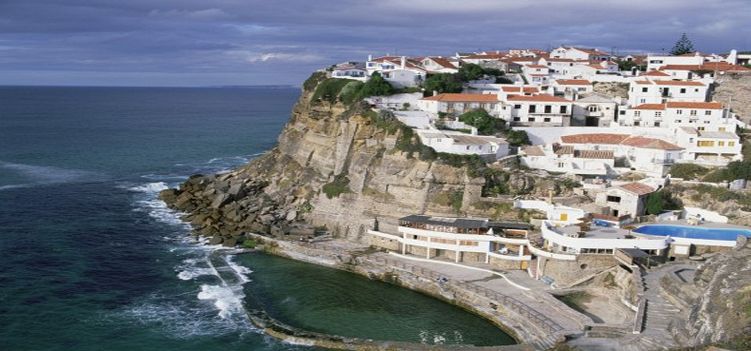Lisbon is recognised as a global city because of its importance in finance, commerce, media, entertainment, arts, international trade, education, and tourism. It is one of the major economic centres on the continent, with a growing financial sector and the largest/second largest container port on Europe's Atlantic coast. Lisbon Portela Airport serves over 15.3 million passengers annually (2012); the motorway network and the high-speed rail system of (Alfa Pendular) link the main cities of Portugal. The city is the seventh-most-visited city in Southern Europe, after Istanbul, Rome, Barcelona, Madrid, Athens, and Milan, with 1,740,000 tourists in 2009. The Lisbon region is the wealthiest region in Portugal, GDP PPP per capita is 26,100 euros (4.7% higher than the average European Union's GDP PPP per capita). It is the tenth richest metropolitan area by GDP on the continent amounting to 110 billion euros and thus €39,375 per capita, 40% higher than the average European Union's GDP per capita.
The city occupies 32nd place of highest gross earnings in the world. Most of the headquarters of multinationals in the country are located in the Lisbon area and it is the ninth city in the world in terms of quantity of international conferences. It is also the political centre of the country, as seat of Government and residence of the Head of State. The seat of the district of Lisbon and the centre of the Lisbon region. Lisbon enjoys a Mediterranean climate. Among all the metropolises in Europe, it has the warmest winters, with average temperatures 15 °C during the day and 8 °C at night from December to February. The typical summer season lasts about six months, from May to October, although also in November, March and April temperatures sometimes reach around 20 °C.
Climate
Lisbon enjoys a warm climate, with mild winters and very warm summers. Strongly influenced by the Gulf Stream it is one of the mildest climates in Europe. Among all the metropolises in Europe, here are the warmest winters on the continent, with average temperatures above 15.2 °C during the day and 8.9 °C at night in the period from December to February. Snow and frost are very rare. The typical summer's season lasts about 6 months, from May to October, with an average temperature of 25 °C during the day and 16.2 °C at night, although also in November, March and April sometimes there are temperature above 20 °C with an average temperature of 18.5 °C during the day and 11.2 °C at night. Rain occurs mainly in winter, the summer is very dry. Lisbon is very close to the ocean and that brings windy and fast-changing weather, so you'd better bring a an extra pair of underwear or an umbrella with you, at least in winter, spring and autumn.
Where to eat
Portuguese dining rituals tend to follow the Mediterranean siesta body clock. Most restaurants are very small, family run and generally cheap. Some of them have a sheet on the door with the "pratos do dia" (dishes of the day) written on it. These dishes are usually cheaper and fresher than the rest of menu there, and unless you're looking for something specific, they're the right choice.
During the dinner the waiter will probably bring you some unrequested starter dishes (called couvert): as those are not free, feel free not to touch them and they will not be charged on your bill (but check it!). Never ask a taxi driver about what restaurant you should go, they will take you to an expensive tourist-oriented restaurant, where they will receive a comission.
Things to do
1. Gulbenkian Museum (Museu Calouste Gulbenkian): Category: Art Museums; Ballets; Concerts; Symphonies. Hours: Tuesday to Sunday: 10 am to 5:45 pm. Closed on Mondays and on the following holidays: Jan. 1, Easter Sunday, May 1, and Dec. 25.
2. Igreja de Sao Roque: Category: Religious Sites; Concerts; History Museums; Architectural Buildings. São Roque Church. The São Roque Church (Saint Roch Church – patron saint of those sick with the plague) is located at Largo Trindade Coelho.
3. Chiado: Category: Neighborhoods. This is the fashionable shopping district in Lisbon.
4. National Tile Museum: There is a national museum dedicated to the azulejo in a former convent, the Convent of the Mother of God. The outside of the convent is not imposing, but inside the convent one finds the huge chapel fascinating.
5. Alfama: Category: Neighborhoods. Wonderful sights delight walkers at every turn in this culturally rich and charming part of Lisbon, which through its architecture reminds visitors of its Visigothic roots, Arabic influence and fishing port heritage.
6. Cascais: Category: Beaches; Scenic/ Historic Walking Areas. An old fishermen's village Cascais has become an European Royalty Riviera in the second half of the XX Century and is now famous tourist destination for Portuguese and foreigners alike.
7. Lisbon Zoo (Jardim Zoologico de Lisboa): Category: Zoos; Gardens. The Lisbon Zoo features 2,000 animals and a dolphin show.
8. Palace of the Marquises (Palacio Fronteira): Category: Castles. The palace was built in 1670 by Joao Mascarenhas, the first Marquis of Fronteira. It was a hunting pavilion in the outskirts of Lisbon. The style was Italian Renaissance, with Portuguese touches. What is interesting about the palace and gardens is the amount of blue and white tile one can find in them.
9. Praca do Comercio: Category: Landmarks/ Points of Interest. Owner description: One of the biggest squares in Europe, this stylish area in downtown Lisbon often displays beautiful works of art and sculpture, and is a great place for a leisurely stroll.
10. St. George's Castle (Castelo de Sao Jorge): Category: Castles; Historic Sites. On top of the highest hill in Lisbon sits St. George’s Castle. The area is called the Alfama. The castle started out as a 5th century Visigothic fort.
11. Vasco da Gama Bridge: Category: Bridges. Owner description: Named after the famous 15th-century explorer, Vasco da Gama, this immense cable-stayed bridge across the Tagus River is eleven miles long, and punctuated with more than seven miles of bridges and viaducts.
12. National Museum of Ancient Art: Category: Art Museums. Owner description: Considered to house the best collection of Portuguese and European art, this museum features works by Gonclaves, Bosch, Raphael and more.
13. Pay a visit to Madeira, this wonderful place with lots of culture and beautiful sights is the place for a nice day to do something different. The Madeira women on the other hand are very beautiful and nice to have a chat with.
14. Go to the beach of Albufeira, this nice place is a real tourisme spot where you find also lots of Portugues women who are also on there holiday.
What are Portuguese Women like
This country is blessed not only with natural beauty but also attractive looking people. Portuguese women are known to be some of the most attractive in the world. Like many people from southern Europe, Portuguese women have dark eyes, think dark hair, long eyelashes and some of the most desirable phisical features. Traditional Porutguese culture encourages women to have curvy bodies while in today's world women are obsessed with being skinny.
Women in Portugal are passionate, ready to love and be loved in return. They have strong family values and at the same time want men to respect their independence.
Portugues women are looking for gentlemen, open a door for a girl, give a bucket of flowers and invite for an evening with candles and you will definitely win a heart of Portuguese lady.






























































